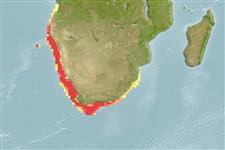Environment: milieu / climate zone / depth range / distribution range
экология
морской батидемерсальный; мигрирует в океане (Ref. 51243); пределы глубины 50 - 1000 m (Ref. 27121), usually 150 - 450 m (Ref. 27121). Deep-water; 11°S - 37°S, 5°E - 33°E (Ref. 58452)
Southeast Atlantic: Baie Farte, Angola around Cape to Natal, South Africa. Also found on Valdivia Bank (26°18'S, 6°20'E).
Length at first maturity / Size / Вес / Возраст
Maturity: Lm 47.4 range ? - ? cm
Max length : 140 cm TL самец/пол неопределен; (Ref. 6605); common length : 50.0 cm TL самец/пол неопределен; (Ref. 1371)
колючие лучи спинного плавника (общее число) : 1; членистые (мягкие) лучи спинного плавника (общее число) : 47 - 54; колючие лучи анального плавника: 0; членистые (мягкие) лучи анального плавника: 37 - 41. Light brown above, silvery to white below (Ref. 6605).
Found on the continental shelf and slope to depths over 1,000 m (Ref. 27121). Juveniles (to about 64 cm) feed on small crustaceans and small deep-sea fishes such as lanternfishes, whereas larger individuals feed chiefly on small hakes and jack mackerel (Ref. 1371); cannibalism is common (Ref. 27121). Migrates southward in the spring and northward in autumn (Ref. 1371). Breeds throughout the year, peaks of reproductive activity in August and September (Ref. 36731). Marketed smoked, frozen, and fresh on ice; eaten steamed, fried and baked (Ref. 9988).
Cohen, D.M., T. Inada, T. Iwamoto and N. Scialabba, 1990. FAO species catalogue. Vol. 10. Gadiform fishes of the world (Order Gadiformes). An annotated and illustrated catalogue of cods, hakes, grenadiers and other gadiform fishes known to date. FAO Fish. Synop. 125(10). Rome: FAO. 442 p. (Ref. 1371)
Статус Красного Списка МСОП (Ref. 130435: Version 2024-1)
Угроза для людей
Harmless
Использование человеком
рыболовство: не имеет хозяйственного значения
дополнительная информация
инструменты
Специальные отчеты
Скачать в формате XML
ресурсы в Интернет
Estimates based on models
Preferred temperature (Ref.
123201): 7.7 - 14.4, mean 10.2 °C (based on 78 cells).
Phylogenetic diversity index (Ref.
82804): PD
50 = 0.5000 [Uniqueness, from 0.5 = low to 2.0 = high].
Bayesian length-weight: a=0.00513 (0.00339 - 0.00775), b=3.11 (2.98 - 3.24), in cm total length, based on LWR estimates for this species & Genus-body shape (Ref.
93245).
Trophic level (Ref.
69278): 3.9 ±0.65 se; based on food items.
Generation time: 9.2 (7.9 - 12.1) years. Estimated as median ln(3)/K based on 21
growth studies.
устойчивость к внешним воздействиям (Ref.
120179): низкий, минимальное время удвоения популяции 4.5-14 лет (K=0.07-0.13).
Fishing Vulnerability (Ref.
59153): High to very high vulnerability (67 of 100).
Climate Vulnerability (Ref.
125649): Very high vulnerability (86 of 100).
Nutrients (Ref.
124155): Calcium = 6.55 [3.45, 22.85] mg/100g; Iron = 0.282 [0.055, 0.771] mg/100g; Protein = 16.8 [15.7, 18.1] %; Omega3 = 0.123 [0.066, 0.231] g/100g; Selenium = 32.1 [14.4, 77.4] μg/100g; VitaminA = 9.09 [1.90, 42.59] μg/100g; Zinc = 0.225 [0.151, 0.358] mg/100g (wet weight);
